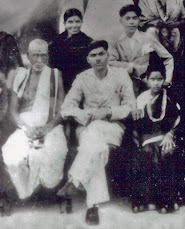Perhaps he had planned this for sometime. He must have made friends with some patients from a distant village in the hills. Patients and their relatives from the villages used to adore him-he had a way with them. Some colleagues envied him for this, others riled him. There was no more a queer, faraway, dreamy, semi-deaf look on his face when he was in the presence of pain and suffering. No wonder, then, that he was welcomed as a God to this village. A full hutment was placed at his disposal, all his needs were met, and he thought himself settled for good. No name-plate, no board, and he could be Mohan or Manohar, though he stuck to Mohan. Of course, there was nothing to sign for; at least life did not depend on it. He felt liberated.
Then it happened. One day a villager was hit by a passing lorry and badly injured. He attended on this man-he had a fractured thigh-bone with an open wound. He put him in a dressing and improvised splints and persuaded the lorry driver to take him to the hospital in town. The village lawyer-and each village has one or two of these self-proclaimed know-alls-insisted that the police should hear of this, that the lorry people had to pay thus much and so on. (I remember a motorist who ran over a village chicken. The car was stopped. A crowd gathered from somewhere. The car-man said he would pay the price of the chicken. The village lawyer, then, came forward and said that the chicken was the special favourite of the owner, and would the driver come to the village panchayat for writing up the case. First, there was only one owner of the chicken, an old woman who began crying; then, there were four, and six more who set up a wailing that should have woken the chicken to life. That and the village lawyer's arguments backed by twenty villagers brandishing fists and sticks made the car-owner pay for a gross of chickens and leave amidst jeers and curses, 'murderer' and 'butcher'.)-The village lawyer had his way and the police came in, and all-in-all it called for a medical certificate from the first doctor who saw the case, and Mohan signed one and gave it to the police.
Mohan forgot all about it. Then one day he received summons to attend the court in town and testify in the accident case on trial. Verification of documents was called for and there was uproar. The court-clerk had a field-day: Never was he faced with such blatant forgery, impersonation: A man calling himself Mohan had stolen the documents of one Dr. Krishna! Now Mohan was posing as the doctor. The court was greatly peeved, and after the town-hospital's doctors came in and assured Mohan, whom they knew, was really Krishna, he was let off. He was threatened with dire consequences if he ever played with his name again.
The village clever-man who was a confused, but close and interested witness to all that happened in court was quite certain that Mohan was a city rogue who was cheating the villagers. He had no love lost for Mohan, because Mohan did not readily agree to go shares with him in the dubious methods of touting he volunteered for the doctor. He knew methods of making wounds worse before they got better, and he knew that giving injections of water was cheaper and more effective, giving green and blue mixtures more palatable and profitable than pale watery stuff. All these things came back to his mind and confirmed for him that Mohan was a swindler. Soon Mohan found that half the village blamed him for all the minor and major things that happened to them since his arrival in the village. One man said that his body did not stop shaking from the day he took medicine from this doctor, and a woman complained that her cow became barren after her own second visit to the doctor six-months back.
So that was that. What is in a name? At first he had a grouse against his parents. Now he knew that the whole society was in this conspiracy to haunt him with a name. What is a name! Without a name he was nothing-that is what it amounted to. And to think that he had no choice in such an important matter, yet so trifling a point. After all, had he not applied the splints correctly-what mattered the name was Krishna or Mohan: It was he, 'He' that did it all, the medicines and splints. It was he, 'He' that ate the bread that his work yielded; Krishna did not apply the splints. Mohan did not eat the bread.
Then it happened. One day a villager was hit by a passing lorry and badly injured. He attended on this man-he had a fractured thigh-bone with an open wound. He put him in a dressing and improvised splints and persuaded the lorry driver to take him to the hospital in town. The village lawyer-and each village has one or two of these self-proclaimed know-alls-insisted that the police should hear of this, that the lorry people had to pay thus much and so on. (I remember a motorist who ran over a village chicken. The car was stopped. A crowd gathered from somewhere. The car-man said he would pay the price of the chicken. The village lawyer, then, came forward and said that the chicken was the special favourite of the owner, and would the driver come to the village panchayat for writing up the case. First, there was only one owner of the chicken, an old woman who began crying; then, there were four, and six more who set up a wailing that should have woken the chicken to life. That and the village lawyer's arguments backed by twenty villagers brandishing fists and sticks made the car-owner pay for a gross of chickens and leave amidst jeers and curses, 'murderer' and 'butcher'.)-The village lawyer had his way and the police came in, and all-in-all it called for a medical certificate from the first doctor who saw the case, and Mohan signed one and gave it to the police.
Mohan forgot all about it. Then one day he received summons to attend the court in town and testify in the accident case on trial. Verification of documents was called for and there was uproar. The court-clerk had a field-day: Never was he faced with such blatant forgery, impersonation: A man calling himself Mohan had stolen the documents of one Dr. Krishna! Now Mohan was posing as the doctor. The court was greatly peeved, and after the town-hospital's doctors came in and assured Mohan, whom they knew, was really Krishna, he was let off. He was threatened with dire consequences if he ever played with his name again.
The village clever-man who was a confused, but close and interested witness to all that happened in court was quite certain that Mohan was a city rogue who was cheating the villagers. He had no love lost for Mohan, because Mohan did not readily agree to go shares with him in the dubious methods of touting he volunteered for the doctor. He knew methods of making wounds worse before they got better, and he knew that giving injections of water was cheaper and more effective, giving green and blue mixtures more palatable and profitable than pale watery stuff. All these things came back to his mind and confirmed for him that Mohan was a swindler. Soon Mohan found that half the village blamed him for all the minor and major things that happened to them since his arrival in the village. One man said that his body did not stop shaking from the day he took medicine from this doctor, and a woman complained that her cow became barren after her own second visit to the doctor six-months back.
So that was that. What is in a name? At first he had a grouse against his parents. Now he knew that the whole society was in this conspiracy to haunt him with a name. What is a name! Without a name he was nothing-that is what it amounted to. And to think that he had no choice in such an important matter, yet so trifling a point. After all, had he not applied the splints correctly-what mattered the name was Krishna or Mohan: It was he, 'He' that did it all, the medicines and splints. It was he, 'He' that ate the bread that his work yielded; Krishna did not apply the splints. Mohan did not eat the bread.











